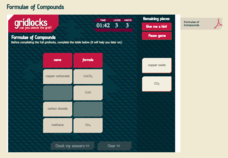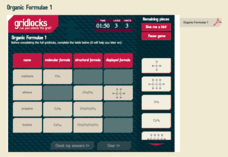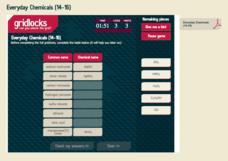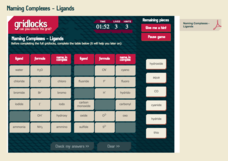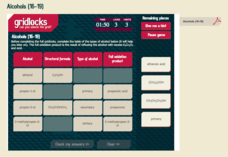Royal Society of Chemistry
Formulae of Compounds
Many people confuse the chemical formulas for copper carbonate and copper oxide. A set of challenging puzzles review commonly confused compound names and their symbols. Through a series of four puzzles, pupils match the names and...
Royal Society of Chemistry
Organic Formulae 1
Puzzles are the formula for success in organic chemistry! Hydrocarbons abound in the first of two interactives involving basic organic molecules. The easy-to-use lesson is available online and in print form, so you can pick your delivery...
Royal Society of Chemistry
Everyday Chemicals (14-16)
Two men want drinks and the first orders H2O. The second man orders H2O too, but he dies. Scholars apply their knowledge of H2O2 and other everyday chemicals during the activity. They match chemical formulas to common chemical names in a...
Royal Society of Chemistry
Naming Complexes—Ligands
Naming complexes can be, well, pretty complex! Simplify a study of ligands using interactive puzzles. Junior chemists match up the name, formula, and complex name, then solve a series of logic games with the information.
Royal Society of Chemistry
Organic Formulae 2
Is your chemistry class frustrated by the multitude of representations of organic molecules? Add some challenging puzzles to an otherwise ho-hum organic lesson and let the fun begin! The second of a two-part activity focused on basic...
Royal Society of Chemistry
Naming Esters
Do your chemistry scholars know their esters? Introduce the class to the nomenclature and structural formulas of common esters through thought-provoking games. Individuals or pairs of pupils match the name with the formula before using...
Royal Society of Chemistry
Some A-level Reagents
Learning names and formulas can be a daunting task for young chemists, so support their study with interactive puzzles! First, users match each formula with its correct name. Then, individuals use them to complete three logic games.
Royal Society of Chemistry
Compounds Ending in 'ate'
Tackle polyatomic ions with Sudoku-like games! Nomenclature novices practice identifying the names and constituents of carbonate compounds with a series of puzzles. Scholars can use the resource online or as a worksheet, thanks to the...
Royal Society of Chemistry
Organic Names—Functional Groups
Worried that your lesson plan about functional groups is dysfunctional? Liven things up with interactive puzzles! Curious chemists arrange functional groups based on name, formula, suffix, and an example. The challenge begins when the...
Royal Society of Chemistry
Naming Binary Compounds
Penguinone is an organic compound named because it resembles a penguin. Scholars match the name of binary compounds to the elements in each compound. Then, they solve three sets of puzzles reviewing the same content.
Royal Society of Chemistry
Extraction of Copper
Is copper found as a raw material? Science sleuths manipulate the reactants and products found in the copper extraction process in a series of fun puzzles. The interactive engages learners in pairing formulas with their names while using...
Spark Notes
Review of Chemical Bonding: Review Test
This is an online exercise in which chemistry learners answer a series of multiple choice questions about bonding. Topics addressed include ionic and covalent bonds, electronegativity, ions, valence electrons, resonance structure, and...
Royal Society of Chemistry
Alcohols (16-19)
Propanol is a common alcohol used in hand sanitizers. The many forms and uses of alcohols fill an intriguing lesson. Scholars apply logic to match alcohols, chemical structural formulas, oxidation products, and more in a series of puzzles.
Royal Society of Chemistry
Common Compounds
Can your young chemists identify the most commonly used chemicals in the lab? Introduce the class to the go-to substances in most middle and high school chemistry experiments with an interactive. The resource offers timely feedback as...
Royal Society of Chemistry
Isomers of (E)-but-2-ene
One chemical formula—but how many different structures? Familiarize young chemists with the concept of isomers through simple, related games. Users identify each isomer base upon its name, structure, and type of isomerization in a set of...
Royal Society of Chemistry
Testing for Gases
If most gases are invisible, how do we know so much about them? Pupils practice associating the name, formula, testing method, and outcome for four common gases using an interactive. Users build on the content of their first puzzles to...
Royal Society of Chemistry
Elements 1
The periodic table can be a little overwhelming to young scientists. Meet your class' worries head on by introducing the table in a game. Individuals test their knowledge of the names and symbols of common elements, then use deductive...
Royal Society of Chemistry
Esters from Alcohols and Acids
Fats and oils often contain esters, which sometimes find their way into perfumes due to their pleasant smells. Scholars match the name of esters made from four different types of alcohol and four different types of carboxylic acids....
Royal Society of Chemistry
Amines and Related Compounds
Scientists call a molecule that contains a nitrogen atom that behaves as a base an amine. Four puzzles, related to amines and similar compounds, challenge scholars to prove their knowledge. After passing each puzzle, the next increases...
Royal Society of Chemistry
Flame Test Colours
Scientists identify elements by the color of flame they produce because each element is defined by exactly one line on the emission spectrum. By completing a series of puzzles, scholars reinforce their knowledge of the results of flame...
Chiral Publishing
Chiral Publishing: An Introduction to Chemistry: Anion Names and Formulas
Test yourself on the names and formulas of some common anions. This interactive animation makes it fun to learn about atoms that have gained electrons.
Chiral Publishing
Chiral Publishing: An Introduction to Chemistry: Binary Covalent Nomenclature
Quiz yourself on binary covalent nomenclature with this interactive animation. Convert formulas to names or names to formulas while learning some common compounds.
